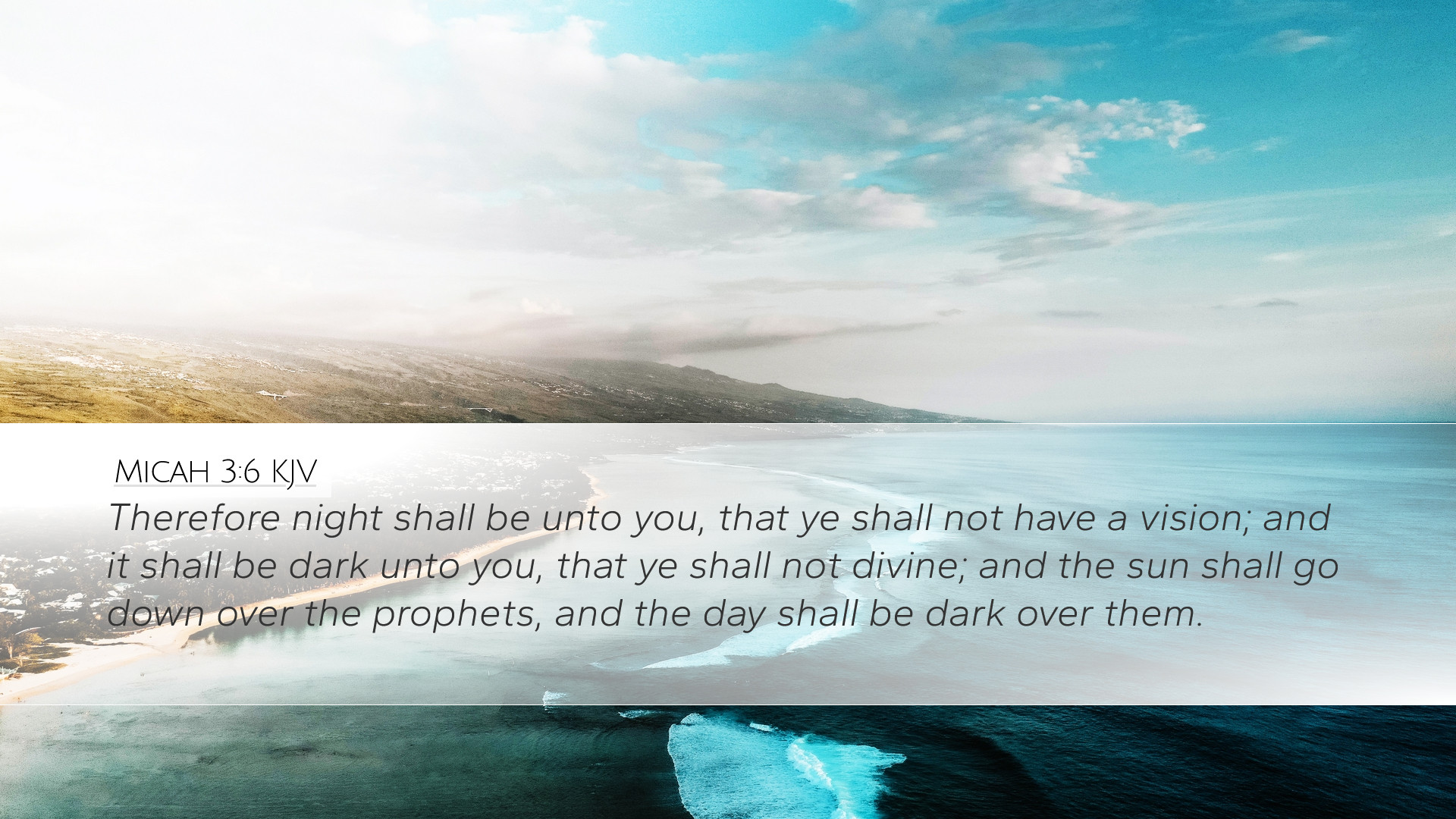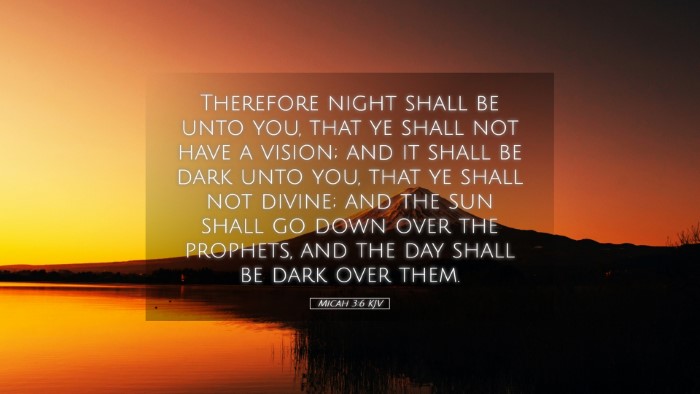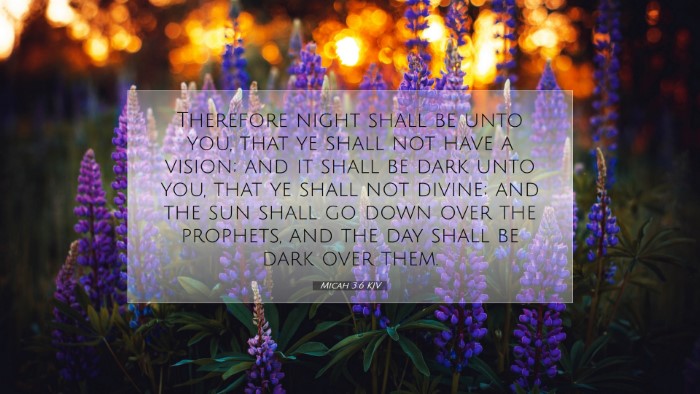Old Testament
Genesis Exodus Leviticus Numbers Deuteronomy Joshua Judges Ruth 1 Samuel 2 Samuel 1 Kings 2 Kings 1 Chronicles 2 Chronicles Ezra Nehemiah Esther Job Psalms Proverbs Ecclesiastes Song of Solomon Isaiah Jeremiah Lamentations Ezekiel Daniel Hosea Joel Amos Obadiah Jonah Micah Nahum Habakkuk Zephaniah Haggai Zechariah MalachiMicah 3:6
Micah 3:6 KJV
Therefore night shall be unto you, that ye shall not have a vision; and it shall be dark unto you, that ye shall not divine; and the sun shall go down over the prophets, and the day shall be dark over them.
Micah 3:6 Bible Commentary
Commentary on Micah 3:6
Verse: "Therefore night shall be unto you, that you shall not have a vision; and it shall be dark unto you, that you shall not divine; and the sun shall go down over the prophets, and the day shall be dark over them."
Introduction
The prophetic book of Micah stands as a testimony to God's unwavering righteousness and judgment. In Micah 3:6, we encounter a weighty declaration made by the prophet concerning the leaders and prophets of Israel, warning them of the consequences of their unfaithfulness. This verse serves as a harbinger of judgment and a metaphorical expression of spiritual darkness that would envelop the people due to their collective sins. The following commentary explores various insights drawn from notable public domain commentators.
Exegesis of Micah 3:6
Micah’s lament is directed primarily towards the leaders of Israel—both civil and religious—whose corruption had led the nation astray. The imagery used in this verse depicts a severe contrast between light and darkness, a recurring biblical theme that signifies clarity versus confusion, guidance versus misdirection, and hope versus despair.
Matthew Henry’s Perspective
Matthew Henry emphasizes that the “night” symbolizes a period devoid of divine guidance and revelation. He notes that the leaders who once claimed to bear God’s messages would instead encounter spiritual silence. The verse illustrates a profound consequence: when prophets who should have illuminated the path of righteousness become corrupt, they lose the very ability to receive revelation from God.
- Spiritual Blindness: Henry posits that the “darkness” indicates a withdrawal of God’s spirit from those who claim to speak for Him, mirroring a spiritual blindness that inhibits their ability to discern truth.
- Judgment on Leadership: He underscores that this darkness came as a direct consequence of the leaders’ moral and ethical failures, signifying that God’s judgment is often manifest in the withdrawal of His presence and guidance.
Albert Barnes’ Commentary
Albert Barnes expands on the prophetic implications of this verse, asserting that the darkness described forebodes a time when God will not respond to the inquiries of the people. He highlights that God’s judgment here is an active withdrawal of light—of understanding and guidance:
- Vision and Divine Insights: Barnes interprets the “vision” as the ability to understand God’s will. When the true prophets fail, the people are left in confusion, seeking answers that will not come.
- Impact of Corruption: He stresses how moral decay among leaders leads to a loss of prophetic revelation, deepening the people’s estrangement from God.
Adam Clarke’s Commentary
Adam Clarke highlights the significance of prophetic authority in shaping communal life within Israel. His reflections on Micah 3:6 underscore the gravity of a leader’s role:
- The Role of Prophets: Clarke points out that the prophets were to serve as mediators of God's truth, yet when they fall into corruption, they are no longer effective in that role. This abandonment of truth leads the nation into darkness.
- Nature of Prophetic Decline: He indicates that the “sun going down” over the prophets symbolizes an end to their influence and thereby a cessation of true guidance for the people.
Thematic Insights
The analysis of Micah 3:6 reveals several enduring themes. It serves as a poignant reminder of the responsibility that leaders and spiritual authorities hold. Their fidelity to God’s truth directly impacts their ability to lead others in the light of His will. The assurance of divine oversight calls for accountability and heart transformation among those entrusted with leadership roles.
Responsibility of Leaders
Scripture throughout emphasizes that leaders must embody integrity and righteousness. The consequences of their actions extend beyond themselves: they affect the entire community. When leaders falter, the repercussions include spiritual and moral decline in the masses, who look to them for direction.
The Consequences of Sin
This passage also underscores the seriousness with which God regards sin. The metaphor of darkness illustrates not only divine judgment but also the sorrow of lost opportunities for communion with Him. Spiritual leaders are reminded that their relationship with God affects their capacity to impart His wisdom and guidance.
The Promise of Restoration
While Micah 3:6 presents a bleak outlook due to the actions of Israel’s leaders, it is essential to view it within the broader narrative of hope found in the book of Micah and Scripture as a whole. God’s judgment is always accompanied by the promise of redemption and restoration for the faithful. This serves as an encouragement for pastors and theologians to emphasize repentance and the transformative power of grace.
Conclusion
In reviewing Micah 3:6, we are reminded of the critical need for faithful leadership rooted in a deep commitment to God’s truth. The warnings delivered by the prophet serve as timely reminders for all who aspire to lead within the church and broader society. As we reflect on this passage, let it spur us into deeper devotion, a hunger for divine revelation, and a commitment to upholding justice and truth in the world around us.


